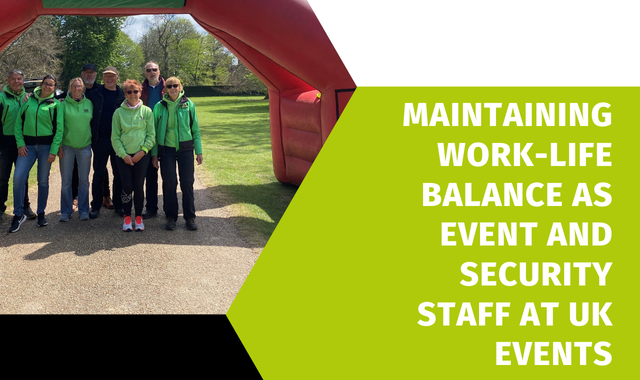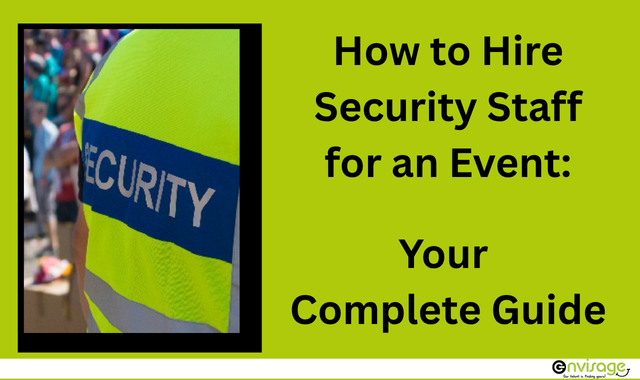Hiring Security Staff for Winter Events, Winter Wonderlands and Ice Rinks Winter events have become…

Maintaining Work-Life Balance as Event and Security Staff at UK Events
Maintaining Work-Life Balance as Event and Security Staff at UK Events
Working as event or security staff at UK events can be incredibly rewarding, but it also comes with its unique set of challenges. The long hours, late nights, and the physical demands of the job can make it difficult to maintain a healthy work-life balance. However, finding that balance is crucial not only for your mental and physical well-being but also for long-term job satisfaction. Here are some strategies to help you manage your work-life balance effectively while working in the events industry.
Set Boundaries Between Work and Personal Life
One of the most important steps to achieving a work-life balance is setting clear boundaries between your work and personal life.
Designated Rest Days: If your schedule is flexible, try to allocate specific days as your rest days where you completely disconnect from work. Use this time to relax, engage in hobbies, or spend time with loved ones.
Learn to Say No: It’s easy to fall into the trap of accepting every security staff shift offered, especially when the pay is tempting. However, taking on too much work can lead to burnout. Learn to recognise your limits and don’t be afraid to decline shifts if you need a break.
Separate Workspace: If you’re working from home or on-call, designate a specific area for work-related tasks. This helps to mentally separate work from leisure and makes it easier to switch off after your shift.
Prioritise Your Health
Your health is your most valuable asset, and prioritising it is key to sustaining a balanced lifestyle.
Physical Fitness: The physical demands of event and security work can be taxing. Regular exercise helps to build endurance and reduce the risk of injury. Incorporate stretching, strength training, and cardio into your routine to stay fit and energised.
Healthy Eating: Event shifts can often lead to irregular mealtimes. Prepare healthy meals and snacks in advance to avoid relying on fast food or skipping meals altogether. Balanced nutrition supports energy levels and helps maintain your overall health.
Sleep Hygiene: Irregular hours can disrupt your sleep patterns. Prioritise good sleep hygiene by maintaining a consistent sleep schedule, even on days off. Create a relaxing bedtime routine and make your sleep environment as comfortable as possible to ensure quality rest.
Manage Stress Effectively
Working in the events industry can be stressful, especially during large or high-profile events. Managing stress effectively is crucial to maintaining a positive work-life balance.
Mindfulness and Relaxation: Practices like meditation, deep breathing exercises, and yoga can help you manage stress. Even just a few minutes of mindfulness each day can significantly improve your mental well-being.
Breaks During Work: During long shifts, ensure you take short breaks whenever possible. Even a few minutes away from the crowd can help you recharge and stay focused.
Talk It Out: Don’t bottle up stress or frustration. Talk to colleagues, friends, or family about your experiences. Sometimes, just sharing what’s on your mind can make a big difference.
Plan and Organise Your Time
Good time management is crucial when trying to balance work and life, especially in a role with unpredictable hours.
Use a Planner: Keep a planner or use a scheduling app to track your shifts, appointments, and personal commitments. Having everything laid out in one place can help you avoid overcommitting and ensure you have time for yourself.
Plan Ahead for Time Off: If you know you’ll be working long hours during certain periods, plan for some downtime afterward. This could be a short holiday, a weekend getaway, or even just a few days to relax at home.
Task Prioritisation: When faced with multiple tasks, prioritise them by importance and deadlines. Focus on completing high-priority tasks first and avoid multitasking, which can lead to burnout.
Stay Connected with Loved Ones
Balancing work with maintaining relationships can be challenging, but it’s essential for your overall well-being.
Schedule Regular Catch-Ups: Make time for regular check-ins with friends and family, even if it’s just a quick call or text. Staying connected with loved ones provides emotional support and helps you recharge.
Involve Them in Your World: Share your work experiences with those close to you. Whether it’s the highs of a successful event or the challenges you face, letting them in on your life helps them understand your schedule and support you better.
Plan Social Activities: Whenever your schedule allows, plan social activities that help you unwind. Whether it’s a casual dinner, a movie night, or a day out, spending quality time with loved ones can help you disconnect from work and relax.
Seek Support When Needed
There’s no shame in asking for help if you’re struggling to maintain balance.
Employee Assistance Programs: Many employers offer assistance programs that provide resources for stress management, financial advice, and other support services. Take advantage of these if you need them.
Peer Support: Don’t hesitate to lean on your security colleagues. They understand the unique challenges of the job and can offer practical advice or simply lend a listening ear.
Professional Help: If stress or work-related issues become overwhelming, consider seeking professional help. A counsellor or therapist can provide strategies to help you cope and maintain balance.
Achieving a Balance: Essential Tips for Event Staff to Thrive in Both Work and Life
Maintaining a work-life balance as event or security staff at UK events may seem challenging, but it’s entirely achievable with the right strategies. By setting boundaries, prioritising your health, managing stress, and staying organised, you can create a more balanced lifestyle that allows you to excel in your role without sacrificing your personal well-being. Remember, it’s not just about working hard—it’s about working smart and ensuring that you have time to enjoy life outside of work.


